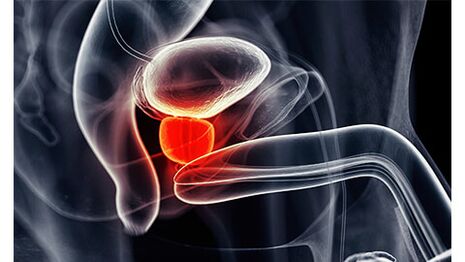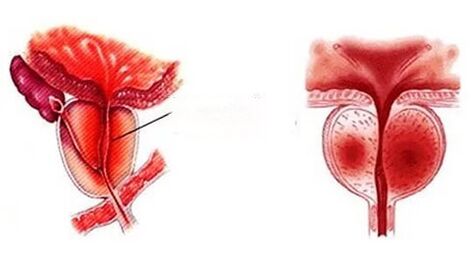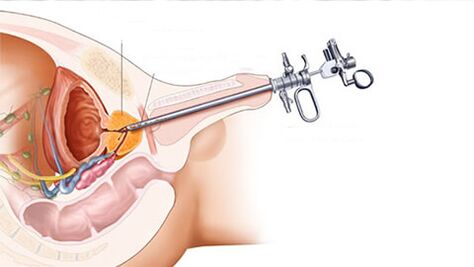
Chronic prostatitis is a slow prostate disease.For him, as for any other chronic pathology, a change in periods of irritation and remittances is characteristic.The disease develops slowly, without giving almost no anxiety to the patient in the early years, with the exception of single symptoms that often do not pay attention.However, the progress of the pathology is able to bring a violation of the function of the prostate gland and the development of complications, so it is important to identify it at an early stage.
You may undergo a preventive urologist examination in the field clinic.If necessary, an individual treatment regimen will develop for you, thanks to which you will get rid of the disease within a short time and avoid complications.
Characteristics of the disease
Chronic prostatitis in men is one of the most common pathologies of the genitourinary system.About 30% of patients from 20 to 50 years of age suffer.
The prostate gland is a non -parallel organ located below the bladder.Is responsible for the quality of the sperm: produces a special secret that is an important ingredient.And during a lift, the prostate iron closes the exit from the bladder.
The reason for the development of acute and chronic prostatitis is often infections (bacterial, viral or fungal origin).They are able to penetrate the prostate gland through the blood, lymph, even if the concentration of infection is far from the prostate.Also, the infection often falls into the prostate gland directly from the urethra.These two organs are interconnected: prostate channels open to the urethra.And also through the prostate gland passes the initial part of the urethra.

The infection can be listed in the prostate even without the presence of pathological processes in the body.After all, each organ is characterized by its own microflora.The microorganisms living in the urethra are harmless in their "habitat".However, for the prostate gland, they can be strangers, and if they fall into it, they can provoke the development of inflammation.
Prostatitis can be:
- Infectious origin - caused by bacteria, viruses or fungi.
- Stagnant natural - develops with a stagnation of the secretion of the prostate gland.
Causes of the development of the disease
The causes of development depend on the form of chronic prostate.Infectious form occurs in the following diseases:
- Urethritis.
- Orchitis (testicular pneumonia).
- Cystitis.
The source of the infection does not have to be located near the prostate gland.Pathology can occur against the backdrop of other infections that progress to the body: caries, sinusitis, pneumonia, bronchitis, etc.
Also, chronic prostatitis is able to develop as a result of an uneven acute process of bacterial origin.
Stagnation of the secretion of the prostate gland occurs due to the stagnation of blood in the pelvic organs, which may come due to:
- Irregular sex life.
- Sedimentary.
- Wearing tight underwear.
- Bad habits (alcohol abuse, smoking).
The stagnant form is found in 85% of cases of chronic prostate.
Factors that increase the risk of developing the disease of both forms include:
- Regular microtrauma, bruises of pelvic organs.
- Improper food.
- Nerve overload.
- Wrong life.
- Hypothermia and long stay in an environment with increased humidity.
These factors either cause a deterioration in the blood supply of the pelvic organs, or increase the possibility of penetrating the infection into the prostate gland.
Diagnosis of chronic prostatitis is made to representatives of some professions more often than people with another type of activity.The risk group includes:
- Trucks and other drivers (forced to be in the same position for a long time).
- Programmers, office employees (sedentary lifestyle).
- Fishermen (stay in the cold for a long time).
- Professional athletes: football players, wrestlers, volleyball players, basketball players (often risk damage to the pelvis area).
- Seafood and geologists (face adverse weather conditions: cold, wet).
Chronic Prostatitis: Symptoms

Symptoms of chronic prostatitis are:
- Pain in the claws, in the lower abdomen: they can be given to the rectum, the sacrum.
- Disordishes lifting disorders, premature spill, lack of spill.
- Disordishes urination disorders: frequent demand for urination, difficulty with bladder emptying, pain during urination.
In the early stages of chronic prostatitis, the symptoms are weak.The pains are irrelevant and pass.Disordishes of urination also occur irregularly.Therefore, the patient often does not give these symptoms important to these symptoms and does not consult a physician.It comes even when the signs of the disease are clearly expressed.
It is also necessary if there are rare symptoms to consult a doctor, otherwise the disease can lead to complications.
Complications of chronic prostatitis
The presence of a continuous focus of infection can lead to its spread to other organs and the development of pathologies in them.The complications of chronic prostate are:
- Cystitis is inflammation of the bladder.
- Pyelonephritis - purulent inflammation of the kidney
- Veziculite - inflammation of the seed bubbles.
- Orchoepididimitis - inflammation of the testicles and their supplements.
Inflammatory diseases of the genitourinary system, on the other hand, are able to bring:
- In infertility.
- in prostate cancer diseases.
- In prostate adenoma.
Reference!In chronic prostatitis, erectile dysfunction often develops.This is due to the fact that the nerves responsible for lifting pass through the prostate gland.When developing a pathological process in it, this often affects them.
Troubleshooting
To identify the disease, you need to visit a urologist or andrologist.First, the doctor will collect the anamnesis: he will hear the complaints and ask questions.Then he will perform a visual inspection and examination of the prostate finger.Moreover, the following types of research may be needed:
- Bacteriological examination of urine.
- Microscopic examination of the secretion of the prostate gland.
- Prostate ultrasound.
- Spermogram.
- A stain from the urethra (to identify sexually transmitted infections).
- Prostate biopsy.
Treatment of chronic prostatitis
The treatment of chronic prostatitis is largely conservative.Surgical is performed only if the therapy does not give the necessary result, or complications appear:
- Prostate abscesses or surrounding fabrics.
- Prostate cancer.
- Prostate adenoma.
- Severe urethra pathologies.
Conservative treatment includes appointment:
- Medicines: non-steroidal anti-inflammatory drugs, antibiotics, alpha blockers, immunomodulators, medicines, accelerating regeneration.With severe pain, medication blocks can be prescribed.
- Prostate massage.It allows you to eliminate stagnant phenomena, improve blood circulation in the affected area and flow of secretion of the prostate gland.However, before describing massage, additional studies are conducted, as it may exacerbate the condition under some conditions.
- Physiotherapeutic procedures.Most often described: magnetic therapy;electrophoresis;Laser therapy;Ultrasound therapy.
- Diet.With its help, it occurs: eliminating the risk of deteriorating inflammation, improving the digestive tract, increased immunity, reduction of load on the internal organs, normalization of blood circulation throughout the body.It is necessary to eat without food, steamed, cooked or baked in the oven, with a minimum of salt.The base of the diet in chronic prostatitis is low fish, weak, lean meat (chicken, turkey, rabbit, beef), cereals, vegetables, pasta products made of whole flour, light soups.It is necessary to exclude: Fried, spicy, fatty, smoked, salty foods, canned foods, semi -finished products, fast food, mushrooms, spices, including onions and garlic, citrus, legumes and cabbage, fatty meat, strong tea, carbonated alcohol, cakes and slopes.
- In severe cases, surgical treatment is performed. Transurethral resection of the prostate gland - the removal of the pathological site or the entire prostate, performed without cuts (the device is presented through the urethra), is most often described for the development of prostate adenoma.Prostatectomy - removing a prostate or its area in the usual surgical way with the implementation of sections.

Preventing chronic prostatitis
To prevent the development of the disease, it is important to timely eliminate any focus of infection in the body.A regular sex life will benefit, excluding random connections.A healthy varied diet and moderate physical activity will strengthen immunity.It is necessary to avoid hypothermia, prolonged landing (if this requires work, it is necessary to take vacations and choose), interior interior.It is also important as an prevention to obtain urologist examinations every year.






























